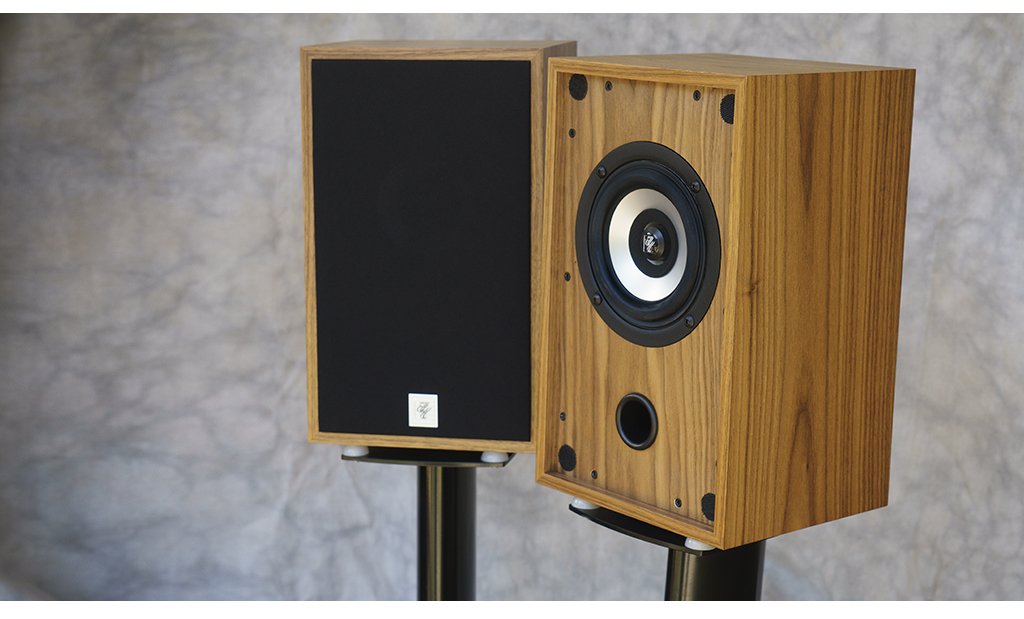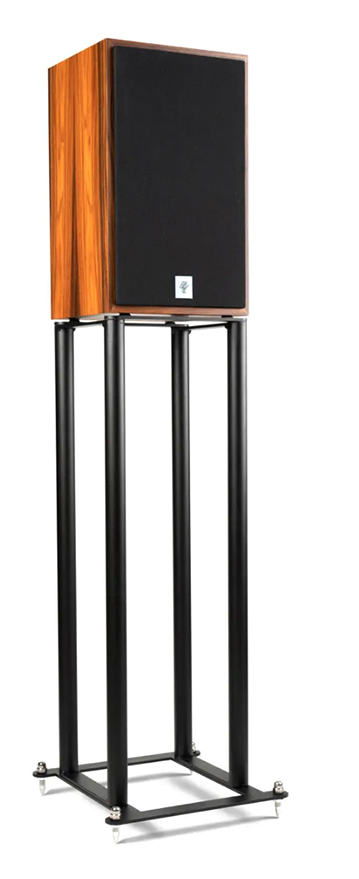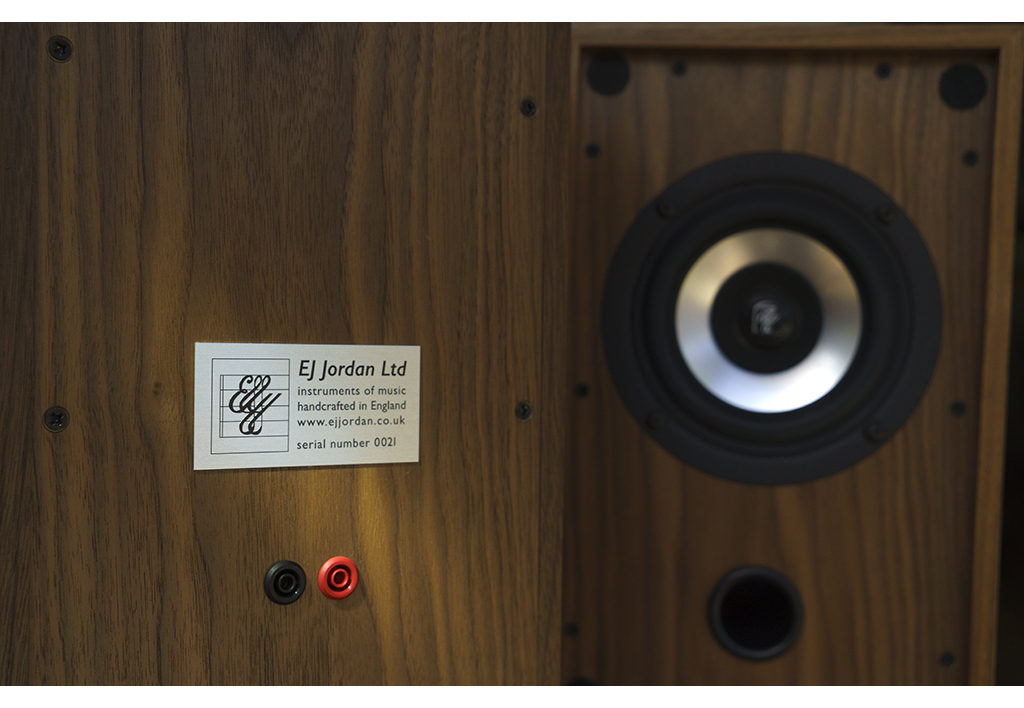The EJ Jordan Marlow Speakers An Interesting Variation on the Small Box Theme
By Jeff Dorgay Listening to Al Green’s “Let’s Stay Together” is increasing the gravitational pull of the couch the minute I hit the play button. If you’ve never heard a good single driver speaker, you might just freak out. In a good way.
Listening to Al Green’s “Let’s Stay Together” is increasing the gravitational pull of the couch the minute I hit the play button. If you’ve never heard a good single driver speaker, you might just freak out. In a good way.
There is something so special about the absence of a crossover network, and all the artifacts that come along with even the best ones – you don’t realize it until it’s missing. And the EJ Jordan Marlows are great single driver speakers.
Moving on to Keith Jarrett’s The Koln Concert makes this particular listening session even more of a treat. There’s a silkiness to the piano that feels absent or forced on other speakers. Where something like a big pair of Wilsons, Focals, or Magicos almost seem hyperdetailed, there’s a relaxed detail here. You can’t have a speaker that is more coherent than one with a single driver.
No, you shouldn’t trade in your Grande Utopias just yet. If you are a true audio enthusiast, this is a pair of speakers you should own, just to have the experience – even if you have a massive pair of floor standers. Just as there are certain watches you should own if you are a watch collector, and certain motorbikes you should take for a spin if that is your passion – I submit you should own a pair of Marlows, and build a system around them.
At about $2200/pair, the Marlows are on the low end of the price scale, if you’re looking at LS3/5As, and even if you go upscale to their CE version (about $300/pair more) these are more than fairly priced. The CE model features pure copper binding posts that will allow you to use speaker cable with spade lug ends, and offer additional damping inside. Our review concentrates on the standard Marlow model, which can only work with banana termination. This was easy as our reference living room system uses Cardas Clear Ultra cables, with banana plugs.
EJ Jordan states the Marlows will produce 86db with one watt – and with no crossover to absorb any power, they are more efficient than other speakers with a similar sensitivity. If you are familiar with Nelson Pass’ theory of the first watt – (if the first watt doesn’t sound great, the rest won’t either) the Marlows are incredibly easy to drive. Staying with that train of thought, starting the listening with the First Watt F3 amplifier that is optimized for single-driver speakers is positively heavenly. The Marlows gave their most extended performance with this amplifier – delivering the most solid, extended bass response and hf response.
A handful of tube amplifiers on hand also prove excellent, but different. The PrimaLuna ProLogue One (30 wpc, EL34 tubes) a warmer, mellower, almost fatter sound, than the Octave V110SE, which is more neutral, yet more dynamic. The conrad-johnson CAV54 mk 2 in our living room system is right down the middle, in terms of dynamics and extension, but proves to be the most three-dimensional experience. My Dynaco Stereo 70 is yet another sonic journey. See why these are so fun?
Back to the music
Now, you don’t have to be an obsessed audiophile to love the Marlows. Hook them up to your favorite integrated and sources and just enjoy them. A pair of 4-inch drivers will only move so much air and play so loud. You can’t rock the house with Zeppelin, but you might just be surprised at how loud these will play in a small-ish room. That’s not really what these are about though – the Marlows are definitely a quality over quantity decision. They provide satisfying results in our 13 x 18 foot room, but were even more lovely when moved to our back room that is only 11 x 13 feet.
On a pair of Sound Anchors 24” stands, about 6 feet apart, finding the perfect spot from the back wall to balance the bass and upper bass just right is critical. Plan on the better part of the day to really optimize these, if you don’t you will find the Marlows only average, and it’s not their fault. You can drive a 43 horsepower Austin Healy Sprite rather spiritedly down a country road, provided you don’t waste a single one of those horses.
The same approach applies to the Marlows. Use decent quality sources, a good amplifier, good cables and be relentless with the setup and they will make magic for you. If your musical taste does center more around vocals, string ensembles, and modest rock/jazz selections without the most major dynamic swings, these speakers will give their all. Going back to “Quiet Houses” from the Fleet Foxes s/t debut, and way back to “Helplessly Hoping” from the Crosby, Stills, and Nash debut both serve up equal levels of excitement. These speakers are all about subtle delicacy, providing a very immersive listening experience at a moderate volume.
Much like a pair of Magnepan SMGs, the bass response that the Marlows offer up is detailed and solid. Listening to the acoustic bass intro to Rickie Lee Jones’ “Easy Money” (especially in my smaller room) is more than compelling enough to have you lamenting what you’re missing. Ending the evaluation with Right Said Fred’s “I’m Too Sexy” is a ton of fun – as he proclaims his sexiness, the way RSF’s drawl eases into nothingness has me re-thinking the fidelity of this track.
Familiar look, yet different internals
If you aren’t paying careful attention, the BBC inspired styling cues of the EJ Jordan Marlow speakers might fool you into thinking you were looking at another LS3/5A. Yet these small British speakers couldn’t be more different. Because they are not under license from the BBC, the Marlows are not held to the same design constraints.
They are meticulously made, yet these compact speakers utilize a single 3.93 inch (100mm) full range Eikona driver. If you click here to go to the EJ Jordan site and poke around a bit, you’ll find out that their designer, Ted Jordan is a powerhouse of speaker engineering. The Eikona driver is assembled at Scan Speak with critical parts originating in the UK.
 A major variation on the theme
A major variation on the theme
I’ve never thought of LS3/5As as wooly or boxy (though they are a bit colored, especially through the mid bass range), but always as fun, very engaging, very musical small speakers that deliver a certain magic in a small room – in a near field situation. Thanks to my friend Erik at Gig Harbor Audio, I’ve even heard the LS3/5As rock in a medium sized room with a good subwoofer.
going back to my pair of reference LS3/5As, I’m now ruined by the clarity that the Marlows provide. I hope the folks at Jordan won’t be too upset with me, but with a pair of REL TZero Mark IIIs staring right at me (with 6-inch woofers, easily able to keep up with the small Jordan cones) it begged to be investigated. I won’t tell you that you must have a pair of small REL subs to enjoy the Marlows, but as someone who uses them with a pair of LS3/5As, you might really dig this combination. It’s a different vibe than the Marlow’s alone, yet with some care, it was easy to tune the RELs to come in ever so gently on the bottom where the Eikona driver rolls off. If your musical taste heads more towards electronica and more full scale music, it’s cheating doing it this way, but really fun. It’s almost like using a pair of Quad 57s (guilty of that sin as well) with subs.
It’s also worth mentioning here that Marlow suggests their stands that are optimized for these speakers. Though my Sound Anchors do, in fact have the solid plate that Marlow advises against. Rather than blu-tack them down as with any other speaker with a more dense, thick wall cabinet, digging a set of Finite Elemente Cerebase pods out of the toolbox, brought a cleaner sound overall. I suspect that going a step futher with the Jordan stands will offer every bit these speakers have to offer.
A must have
Whether you are building a compact, yet high-performance system for a small room, a second system, or even just want to keep a pair of these around for when you’re in the mood for a different drive, the EJ Jordan Marlows are one of the most enjoyable speakers we’ve had the pleasure to listen too. These may just end up back here at some point on a permanent basis.




